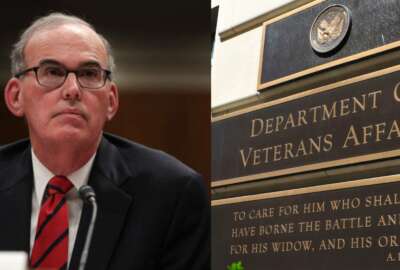

The Department of Veterans Affairs said it has the right leadership and contractors in place this time to resolve the department's longstanding IT issues and pr...
After widespread criticism from members of Congress and the agency’s inspector general, the Department of Veterans Affairs said it’s better positioned now to meet its new, self-imposed deadline to implement the remaining pieces of the Forever GI bill.
VA late last year announced plans to reset implementation of portions of the Forever GI Bill to give the department more time, contracting support and resources.
The initial deadline to begin processing education and housing benefits under the Forever GI bill was initially back in August
But the department’s legacy IT systems couldn’t handle the changes the department needed to make in disseminating certain housing benefits under the new law. VA decided to disregard any overpayments it had made to GI beneficiaries and instead focus on making the veterans who had been underpaid whole.
The Veterans Benefits Administration has processed more than 450,000 corrections as of the end of January, Lawrence said.
Now with a new deadline of Dec. 1, VA said this time will be different.
First, VA has named Paul Lawrence, the undersecretary for benefits, to lead all decision-making and keep track of all activities associated with the implementation project. The department stood up a program integration office to ensure everyone associated with Forever GI bill implementation was on the same page.
“From our perspective what we’ve seen in the last few months is that issues that previously could take weeks or months are now being adjudicated effectively in days or sometimes hours,” Jay Schnitzer, vice president and chief technology officer for the MITRE Corporation, said of the new program integration office.
But VA said the decision to sign two new contracts is also making the difference. It signed a one-year, $5.2 million contract with MITRE to support and implement a program integration strategy.
In addition, VA in February awarded a $14 million, firm, fixed-price contract to Accenture to coordinate planning, developing and testing for all systems associated with the GI bill implementation.
“The scope of their contract includes development of new software, interfacing with legacy systems, system architecture and testing,” Lawrence said. “Accenture and VA started working on implementation efforts the same day the new contract was awarded.”
MITRE also conducted an independent technical assessment of the capabilities VA would need to implement the Forever GI bill. MITRE offered up 20 recommendations, and VA has completed half of them to date, Lawrence said.
The department plans to implement another nine recommendations by June 30, he added. The final recommendation to develop a common testing environment for the IT systems necessary for Forever GI bill implementation should be finished by Sept. 30.
Lawrence said MITRE has helped VBA better understand the scope of the original problems.
But Rep. Jim Banks (R-Ind.), ranking member of the VA IT subcommittee said the timing of this last recommendation concerned him. If new software code is finished by Sept. 30, that doesn’t give VA much time to test everything and make corrections by Dec. 1.
“In ideal conditions it could be one of the first steps completed,” Schnitzer said of the software development and systems integration work. “On the other hand we live in the real world where some things depend on sequences, and you can’t change that. This is one of those. There’s no practical or physical way to change the sequence presented before us today. It has to be number 20, and we have to do the best we can with that. However, it can be mitigated. The integrated test doesn’t occur until the very end, but individual tests along the way in other environments are occurring all the time. That reduces the risk of the final test.”
Lawrence acknowledged the timeline was a short one but said he is confident VA wouldn’t need to rush to meet the implementation deadline.
VA had initially contracted with Booz Allen Hamilton last year to help with Forever GI bill implementation. Booz Allen had developed specific code for Forever GI bill implementation, but VA hired MITRE and Accenture to develop new code instead.
“We did not understand what date we would ever be able to complete the software,” Lawrence said of the department’s interactions with Booz Allen. “Repeatedly we came up short. The contractor was unable to identify how we would ever get this resolved, and I was quite frankly embarrassed to sit in front of you in November in front of this committee last year and not be able to provide a date of when it would be done. We were approaching the problem in the wrong way. We needed a reset, which is what we did, and we needed better [and] different expertise to help us.”
Some House VA committee members were skeptical of the department’s choice of contractors. But for others, the department’s IT challenges with the Forever GI bill are concerning not because they’re unusual — but because they’re ordinary.
Antiquated legacy IT systems, complicated inter-dependencies between those systems and too many data feeds from too many databases have defined VA’s problems with Forever GI bill implementation.
“That could describe nearly every situation our subcommittee has ever examined,” Banks said.
In assessing the challenges with Forever GI bill implementation, the department’s inspector general, Michael Missal, said VA lacked a single accountable official for the implementation project. It didn’t have one until 10 months after the GI bill had been signed into law, he said.
“There didn’t seem to be a sense of urgency to get the project off the ground,” Missal said.
For some members, lack of governance has become a common problem, especially as both VA and DoD struggle to define a clear leader as both departments move forward with the development of a common, interoperable electronic health record.
“We have been asking repeatedly for VA and the Department of Defense to provide information about their governance proposal for months, but all we hear is crickets,” Rep. Susie Lee (D-Nevada), the IT subcommittee chairman, said. “Meanwhile, the program continues to move forward further down the track and millions of dollars are being spent. Building a house on a shaky foundation has real risks, and a lack of governance is going to be a program down the line.”
Copyright © 2024 Federal News Network. All rights reserved. This website is not intended for users located within the European Economic Area.
Nicole Ogrysko is a reporter for Federal News Network focusing on the federal workforce and federal pay and benefits.
Follow @nogryskoWFED



